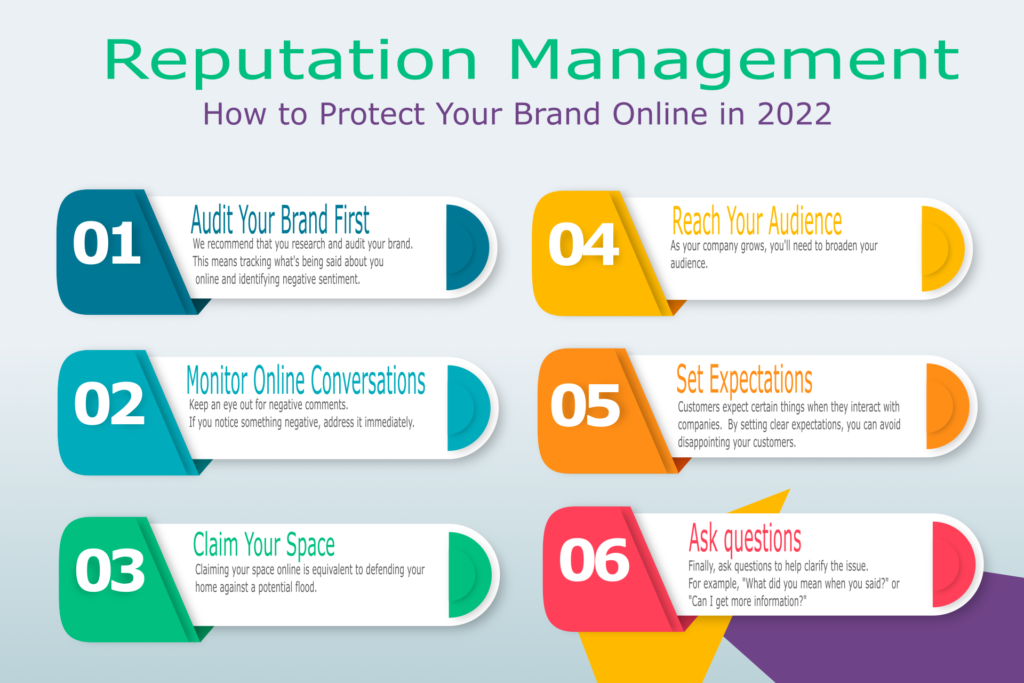As the digital landscape continues to evolve, reputation management has become a critical component of marketing strategy. Consumers today expect brands to provide them with information, services, and experiences that align with their values. Brands that meet these expectations have higher odds of success.
But if you don’t know what you’re doing, you could be putting yourself out there without even realizing it. That’s why we’ve put together this step-by-step guide on how to protect your reputation online.
Are you aware of the importance of maintaining a positive reputation online? If you haven’t already, now is the time to take responsibility for your online image. The Internet has become an integral part of our lives and businesses. Negative comments or posts about your brand can have serious consequences.
More than 90% of adults search for information online, and 93% never look past the first page. Worryingly, 65% of those adults trust these search results more than any other source. Negative feedback posted on social media can damage a company’s reputation. It has many benefits; we have mentioned the five most prominent ones of those:
- Boosts Sales.
- Improves Brand Visibility.
- Builds Brand Image.
- Builds Trust and Credibility.
- Generates Valuable Business Insights.
Why Do You Need An ORM Plan?
It would help if you created an ORM plan for your business for several reasons.
- First, it gives you a clear picture of where you stand right now.
- Second, it provides you with a roadmap for future growth.
- Third, it shows you exactly what steps you need to take to reach your goals.
- Fourth, it lets you know whether or not you’re making progress toward those goals.
- And finally, it keeps you focused on the things that matter.
Build An Effective ORM Plan For Your Business
ORM strategies have become a necessity for every company these days. The reason is that today’s consumers spend much time researching before deciding whether to patronize a particular brand. It is a service that helps companies manage their online presence by monitoring and responding to negative feedback posted on social media platforms.
Companies that neglect their online reputation risk losing customers and revenue. Businesses must invest in ORM services to ensure that their reputations remain intact.

1. Audit Your Brand First
We recommend that you research and audit your brand. This means tracking what’s being said about you online and identifying negative sentiment. You can do this through Online Reputation Management tools like Google Alerts and SocialMention. These tools allow you to track mentions of your company across the web. It would be best to search for keywords related to your company name on review sites like Yelp, TripAdviser, and Glassdoor.
If you find any negative comments, take steps to address those issues. You can respond to the review directly on the website or contact the reviewer privately. You should monitor your competitors’ online activity as well. Use a management tool like HubSpot to help you keep track.
2. Monitor Online Conversations
Keep an eye out for negative comments. If you notice something negative, address it immediately. For example, if a customer complains about a product, you could offer them a free replacement or refund. If you receive a complaint about your company’s services, you could provide a solution or explain why the problem occurred.
3. Claim Your Space
Claiming your space online is equivalent to defending your home against a potential flood. Every profile, website, and a company you own under your name can serve as a shield against potential losses. Each portfolio and domain name you own in your name can help protect you from negative search engine results, eventually pushing them off the first page. Begin with Facebook and Twitter, then move on to Instagram, Pinterest, LinkedIn, and Google+. Do the same for your company if you’re a business owner.
Remember to expand your web presence on professional networking sites such as Yelp, the Better Business Bureau, and Google MyBusiness. Even if you don’t intend to use these profiles right away, you’ll want to be able to manage them.
4. Reach Your Audience
As your company grows, you’ll need to broaden your audience. You might already have a following, or you might be starting from scratch. In any case, you can begin connecting with them on social media. Responding to comments and engaging with your audience will provide valuable feedback on what works and what does not. You’ll learn more about the interactions your audience enjoys and dislikes, allowing you to better adapt your content to their needs.
After you’ve defined your target audience, you can start reaching out to them through various channels. For instance, you could publish articles on Facebook, Twitter, LinkedIn, Instagram, and other platforms to reach a larger audience.
Alternatively, you could concentrate your efforts on appealing to a more specialized audience. Whatever you decide, always keep your audience in the forefront of your mind when producing content. Always share your posts on social media because it increases engagement and visibility.
5. Set Expectations
Customers expect certain things when they interact with companies. For instance, if you sell clothing, you may not want to post pictures of yourself wearing your clothes. Similarly, you probably won’t post photos of yourself driving around town if you sell a car. By setting clear expectations, you can avoid disappointing your customers.
6. Ask questions
Finally, ask questions to help clarify the issue. For example, “What did you mean when you said?” or “Can I get more information?” Remember that you may need to provide additional information to resolve the complaint.
Respond To Negative Reviews About Your Company Online
Are you worried about negative comments or feedback about your brand or service? If yes, then you should respond to customer reviews. Otherwise, you might miss valuable insights from customers willing to share their experiences.
Customer reviews can be a powerful tool for businesses because they provide insight into how well your company is performing. In addition, they also allow consumers to voice their opinions about your brand.
It’s vital to respond to customer reviews as soon as possible. This shows that you care about your customers and take them seriously. And if you don’t reply, it can hurt your reputation and cost you sales.
Tips To Properly Respond To Negative Comments
Negative reviews are inevitable. If you’re not prepared for them, they can hurt your business. But if you respond proactively, you can turn these reviews into opportunities to improve your product or service. Here are some tips for how to handle negative reviews effectively:
- Analyze. It would help if you took the time to analyze feedback to protect yourself from negative thoughts. You may think you are doing something wrong when you do not have any positive reviews. However, if you look at the comments carefully, you will notice that some people don’t know what they are talking about. If you want to get rid of bad reviews, you should ask them to leave a review.
- Don’t Get Defensive. Instead, acknowledge the review and explain what you plan to do to address any concerns.
- Wait Before Responding. Do not respond to negative reviews immediately. Sometimes, people who write negative reviews are looking for attention. To avoid being targeted by these people, you should ignore their comments. Instead, you should focus on the good reviews and try to improve your business.
- Address The Issue. Make sure you have a clear action plan for addressing the problem.
- Fix The Issue. Respond to negative reviews only after you have done everything possible to fix the problem. If you respond to negative reviews right away, you might lose customers.
- Follow up. Send a thank-you note or follow up via email after you’ve addressed the issue.
- Ask For Feedback. You may need to ask customers to provide specific details about their experience.
- Record Negative Reviews. Always keep a record of the negative reviews. You should note down the date and time of the comment. You should also note down the name of the person who wrote the review. This way, you will be able to determine whether the reviewer was genuine.
- Don’t Delete Reviews. Never delete negative reviews. If you delete negative thoughts, you will lose credibility among your customers.
- Stay Genuine. Don’t give fake replies to negative reviews. You will lose credibility if you reply to a negative thought with a phony message.
- Thank The Reviewer. Always thank reviewers for leaving positive reviews. A simple thanks goes a long way.
- Offer Discounts. Don’t forget to offer discounts. Offering discounts to your customers will encourage them to buy more from you.
Final Words
In summary, managing your online reputation is one of the most critical aspects of digital marketing today. By taking the time to monitor your reputation, you can protect yourself from damaging comments. While bad reviews may hurt your business temporarily, they don’t always mean much in the long run. By learning to protect yourself from negative reviews, you’ll be able to focus on what matters—building your brand and growing your business.
- Written by: admin
- Posted on: July 27, 2022
- Tags: Marketing, Online Programs, online Reputation Management, Reputation Management

